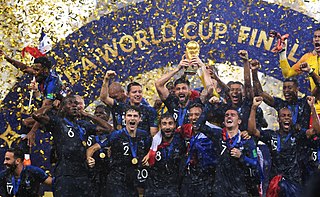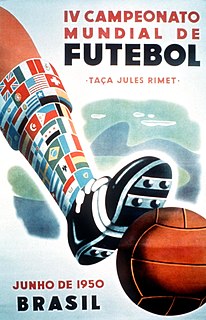This article is being considered for deletion in accordance with Wikipedia's deletion policy. Please share your thoughts on the matter at this article's deletion discussion page. |
The first event of the FIFA World Cup starts with a kind of lottery but instead of selecting classified numbers, in this contest a country is selected; most had been made in January of the tournament year until 1982 and since the 1986 World Cup it is held in early December of the year before the start of the tournament.
The first version of the draw had been made in a football association's office, a few days before the 1930 World Cup; it was also repeated in 1934. Five of these have been held in hotel ballrooms; the 1950 draw was conducted in the office of a government agency. The 1958 draw was the first to be held in a television studio. The 1986 draw was notable as it was held less than two months after an earthquake struck the host nation's capital. A party was held a few hours before the 1998 draw which was the first to be performed in a stadium that hosted the tournament. The first draw that involved celebrity guests such as musical artists was held for the first time in 1990, a practice maintained until now. [1] It was also held in a city that would not host the tournament like the one in 1994 that was developed in Las Vegas.
The following table shows the times a country has been part of the World Cup groups.
Updated to include Qatar 2022
The current format of the draw has been criticized for lacking balance, fairness and equal distribution of quality. A study in the Journal of Quantitative Analysis in Sports suggested that while the current model does ensure Randomness, Tractability, and Geographic separation, it "fails to satisfy the principle of balance". [7] Under the study's proposed draw model, based on over 40,000 simulations of the 2014 draw, the model exhibited a much more balanced group and much less variation in the strength of the groups when compared to the current system utilized by FIFA.

The FIFA World Cup, often simply called the World Cup, is an international association football competition contested by the senior men's national teams of the members of the Fédération Internationale de Football Association (FIFA), the sport's global governing body. The championship has been awarded every four years since the inaugural tournament in 1930, except in 1942 and 1946 when it was not held because of the Second World War. The current champions are France, who won their second title at the 2018 tournament in Russia.

The 1950 FIFA World Cup was the fourth edition of the FIFA World Cup, the quadrennial international football championship for senior men's national teams and held in Brazil from 24 June to 16 July 1950. The planned 1942 and 1946 World Cups were cancelled due to World War II. This tournament ended the hiatus. Uruguay, who had won the inaugural competition in 1930, defeated the host nation, Brazil, in the deciding match of the four-team group of the final round. This was the only tournament not decided by a one-match final. It was also the inaugural tournament where the trophy was referred to as the Jules Rimet Cup, to mark the 25th anniversary of Jules Rimet's presidency of FIFA.

The 1994 FIFA World Cup was the 15th FIFA World Cup, the world championship for men's national soccer teams. It was hosted by the United States and took place from June 17 to July 17, 1994, at nine venues across the country. The United States was chosen as the host by FIFA on July 4, 1988. Despite soccer's relative lack of popularity in the host nation, the tournament was the most financially successful in World Cup history. It broke tournament records with overall attendance of 3,587,538 and an average of 68,991 per game, marks that stood unsurpassed as of 2018 despite the expansion of the competition from 24 to 32 teams starting with the 1998 World Cup.

The 1974 FIFA World Cup was the tenth FIFA World Cup, a quadrennial football tournament for men's senior national teams, and was played in West Germany between 13 June and 7 July. The tournament marked the first time that the current trophy, the FIFA World Cup Trophy, created by the Italian sculptor Silvio Gazzaniga, was awarded. The previous trophy, the Jules Rimet Trophy, had been won for the third time by Brazil in 1970 and awarded permanently to the Brazilians. This was the first out of three World Cups to feature two rounds of group stages.

The 1978 FIFA World Cup was the 11th edition of the FIFA World Cup, a quadrennial international football world championship tournament among the men's senior national teams. It was held in Argentina between 1 and 25 June.

The 1990 FIFA World Cup was the 14th FIFA World Cup, a quadrennial football tournament for men's senior national teams. It was held from 8 June to 8 July 1990 in Italy, the second country to host the event for a second time. Teams representing 116 national football associations entered and qualification began in April 1988. 22 teams qualified from this process, along with host nation Italy and defending champions Argentina.

The FIFA Women's World Cup is an international association football competition contested by the senior women's national teams of the members of Fédération Internationale de Football Association (FIFA), the sport's international governing body. The competition has been held every four years and one year after the men’s FIFA World Cup since 1991, when the inaugural tournament, then called the FIFA Women's World Championship, was held in China. Under the tournament's current format, national teams vie for 31 slots in a three-year qualification phase. The host nation's team is automatically entered as the 32nd slot. The tournament, called the World Cup Finals, is contested at venues within the host nation(s) over a period of about one month.

The FIBA Basketball World Cup, also known as the FIBA World Cup of Basketball or simply the FIBA World Cup, between 1950 and 2010 known as the FIBA World Championship, is an international basketball competition contested by the senior men's national teams of the members of the International Basketball Federation (FIBA), the sport's global governing body. It is considered the flagship event of FIBA.

The Canada women's national soccer team is overseen by the Canadian Soccer Association and competes in the Confederation of North, Central American and Caribbean Association Football (CONCACAF).
The FIFA Beach Soccer World Cup is an international beach soccer competition contested by the national teams of the member associations of FIFA, the sport's global governing body. The tournament was preceded by the Beach Soccer World Championships established in 1995 which took place every year for the next decade under the supervision of Beach Soccer Worldwide (BSWW) and its predecessors. FIFA joined hands with BSWW in 2005 to take over the organization of the competition, re-branding it as an official FIFA tournament.
The FIFA World Cup qualification is the process that a national association football team takes in order to qualify for one of the available berths at the final tournament of the (men's) FIFA World Cup.
The FIFA World Cup was first held in 1930, when FIFA, the world's football governing body, decided to stage an international men's football tournament under the era of FIFA president Jules Rimet who put this idea into place. The inaugural edition, held in 1930, was contested as a final tournament of only thirteen teams invited by the organization. Since then, the World Cup has experienced successive expansions and format remodeling, with its current 32-team final tournament preceded by a two-year qualifying process, involving over 200 teams from around the world.

Seventeen countries have been FIFA World Cup hosts in the competition's twenty-one tournaments since the inaugural World Cup in 1930. The organization at first awarded hosting to countries at meetings of FIFA's congress. The choice of location was controversial in the earliest tournaments, given the three-week boat journey between South America and Europe, the two centers of strength in football at the time.

The International Basketball Federation is an association of national organizations which governs the sport of basketball worldwide. Originally known as the Fédération internationale de basket-ball amateur, in 1989 it dropped the word amateur from its name but retained the acronym.
The 2022 FIFA World Cup qualification was the qualifying process which decided the 31 teams that would join hosts Qatar, who received an automatic spot, at the 2022 FIFA World Cup.
The Uganda women's national football team is the national women's football team of Uganda and is controlled by the Federation of Uganda Football Associations.
The 2026 FIFA World Cup will be the 23rd FIFA World Cup, the quadrennial international men's soccer championship contested by the national teams of the member associations of FIFA. The tournament will be jointly hosted by 16 cities in three North American countries: Canada, Mexico, and the United States. Sixty matches, including every match from the quarterfinals onward, will be hosted by the United States while neighboring Canada and Mexico will each host 10 matches. The tournament will be the first hosted by three nations. This tournament will be the first to include 48 teams, expanded from 32.
Association football is the most popular sport in almost all North, Central American and Caribbean countries, and eleven members of the Confederation of North, Central American and Caribbean Association Football, CONCACAF, have competed at the sport's biggest event – the men's FIFA World Cup.
The FIFA World Cup, sometimes called the Football World Cup or the Soccer World Cup, but usually referred to simply as the World Cup, is an international association football competition contested by the men's national teams of the members of Fédération Internationale de Football Association (FIFA), the sport's global governing body. The championship has been awarded every four years since the first tournament in 1930, except in 1942 and 1946, due to World War II.
This is a record of the Czech Republic's results at the FIFA World Cup, including those of Czechoslovakia which is considered as the Czech Republic's predecessor by FIFA. The FIFA World Cup, sometimes called the Football World Cup or the Soccer World Cup, but usually referred to simply as the World Cup, is an international association football competition contested by the men's national teams of the members of Fédération Internationale de Football Association (FIFA), the sport's global governing body. The championship has been awarded every four years since the first tournament in 1930, except in 1942 and 1946, due to World War II.